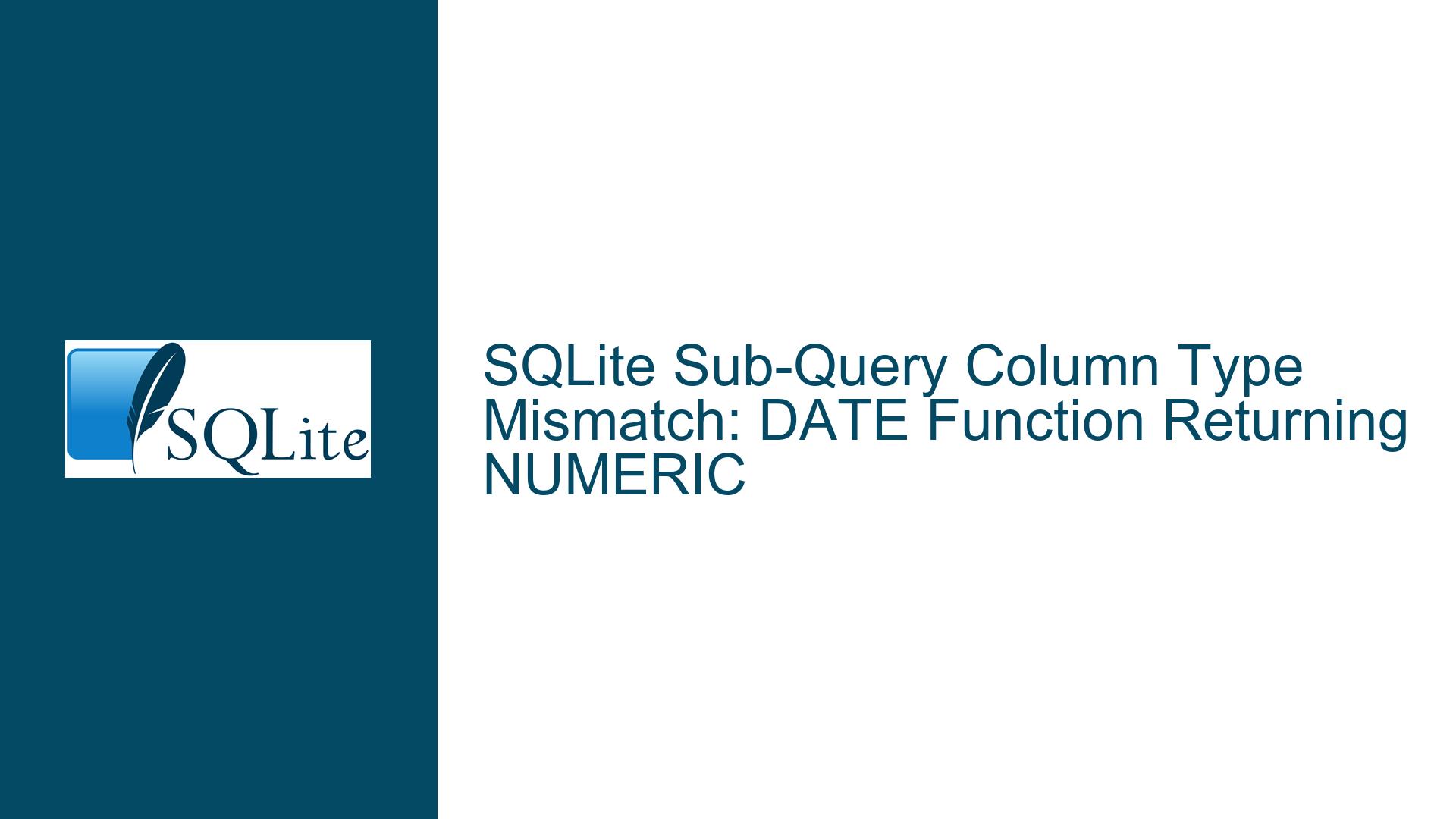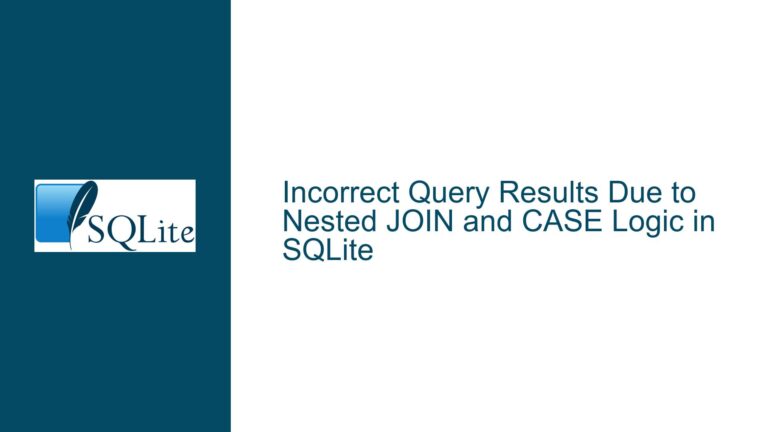SQLite Sub-Query Column Type Mismatch: DATE Function Returning NUMERIC
SQLite’s Handling of Column Types in Sub-Queries with DATE Functions
SQLite is a lightweight, serverless database engine that is widely used for its simplicity and efficiency. However, its type system can sometimes lead to unexpected behavior, especially when dealing with sub-queries and functions like DATE(). One such issue arises when a sub-query involving the DATE() function returns a column that is interpreted as NUMERIC instead of a date type. This behavior can be particularly confusing when using JDBC drivers, which may further interpret this type in ways that are not immediately intuitive.
In SQLite, the DATE() function is used to format a date string according to a specified format. However, SQLite does not have a native date type. Instead, dates are typically stored as strings in the YYYY-MM-DD format or as numeric values representing Julian day numbers. When a function like DATE() is used in a sub-query, SQLite does not assign a specific type to the resulting column. This is because SQLite’s type system is dynamic and does not enforce strict type constraints on function return values.
The issue becomes apparent when the result of such a sub-query is accessed through a JDBC driver. The JDBC driver, which is responsible for translating SQLite’s internal representations into Java types, may interpret the column type as NUMERIC because SQLite does not provide a specific type declaration for the column. This can lead to confusion, especially when the data in the column is clearly a date string and not a numeric value.
JDBC Driver Interpretation of SQLite’s Dynamic Typing
The core of the issue lies in how SQLite’s dynamic typing interacts with the JDBC driver’s type resolution mechanism. SQLite uses a manifest typing system, which means that the type of a value is associated with the value itself, not with the column in which the value is stored. This allows for a great deal of flexibility but can also lead to ambiguity when the type of a column is not explicitly declared.
When a sub-query is executed, SQLite does not provide explicit type information for columns that are the result of functions like DATE(). Instead, it returns a generic type, which the JDBC driver may interpret as NUMERIC. This interpretation is not necessarily incorrect from SQLite’s perspective, as the database engine itself does not enforce strict type constraints on function return values. However, it can be problematic for applications that rely on the JDBC driver to provide accurate type information.
The JDBC driver’s behavior is influenced by the sqlite3_column_decltype() function, which is used to retrieve the declared type of a column. However, this function only works if the column is directly derived from a table column. In the case of a sub-query involving a function like DATE(), there is no declared type, and the function returns NULL. The JDBC driver then defaults to interpreting the column type as NUMERIC, which is a catch-all type for numeric values.
This behavior can be particularly confusing when the data in the column is clearly a date string. For example, a value like "2004-05-06" is not a numeric value, but the JDBC driver may still report the column type as NUMERIC. This discrepancy can lead to issues in applications that rely on the JDBC driver to provide accurate type information for result sets.
Resolving Column Type Mismatches in SQLite Sub-Queries
To address the issue of column type mismatches in SQLite sub-queries, it is important to understand the underlying causes and to implement appropriate solutions. One approach is to explicitly cast the result of the DATE() function to a specific type within the sub-query. This can be done using the CAST or TYPEOF functions in SQLite, which allow you to specify the type of a value explicitly.
For example, consider the following modified query:
SELECT DETAIL.DC_ALIAS_0 AS DC_ALIAS_0,
DETAIL.DC_ALIAS_1 AS DC_ALIAS_1,
DETAIL.DC_ALIAS_2 AS DC_ALIAS_2,
DETAIL.DC_ALIAS_3 AS DC_ALIAS_3
FROM
(SELECT DISTINCT t17.PARAMETER AS DC_ALIAS_0,
CAST(DATE(t18.DATE, 'start of year') AS TEXT) AS DC_ALIAS_1,
SUM(t18.VALUE) AS DC_ALIAS_2,
'{t:d}' AS DC_ALIAS_3
FROM (MST_VALUE t18
INNER JOIN MST_PARAMETER t17 ON (t18.PARAMETER_NO = t17.PARAMETER_NO))
GROUP BY t17.PARAMETER,
DATE(t18.DATE, 'start of year')
UNION ALL SELECT DISTINCT t17.PARAMETER AS DC_ALIAS_0,
NULL AS DC_ALIAS_1,
SUM(t18.VALUE) AS DC_ALIAS_2,
'{t:st}' AS DC_ALIAS_3
FROM (MST_VALUE t18
INNER JOIN MST_PARAMETER t17 ON (t18.PARAMETER_NO = t17.PARAMETER_NO))
GROUP BY t17.PARAMETER) DETAIL
ORDER BY DETAIL.DC_ALIAS_0,
DETAIL.DC_ALIAS_1
In this modified query, the DATE() function’s result is explicitly cast to TEXT using the CAST function. This ensures that the column type is explicitly declared as TEXT, which the JDBC driver will interpret correctly. This approach can be used to avoid the ambiguity that arises when SQLite does not provide explicit type information for function return values.
Another approach is to use a custom type resolver in the JDBC driver. Some JDBC drivers allow you to specify custom type resolvers that can be used to override the default type resolution behavior. This can be particularly useful when dealing with complex queries that involve multiple functions and sub-queries. By implementing a custom type resolver, you can ensure that the JDBC driver interprets column types correctly, even when SQLite does not provide explicit type information.
Finally, it is important to ensure that your application is robust enough to handle potential type mismatches. This can be done by implementing appropriate error handling and type checking in your application code. For example, you can use the TYPEOF function in SQLite to check the type of a value before processing it in your application. This can help you avoid issues that arise from unexpected type interpretations by the JDBC driver.
In conclusion, the issue of column type mismatches in SQLite sub-queries involving the DATE() function can be addressed by understanding the underlying causes and implementing appropriate solutions. By explicitly casting function results to specific types, using custom type resolvers, and implementing robust error handling in your application, you can ensure that your SQLite queries are interpreted correctly by the JDBC driver.






